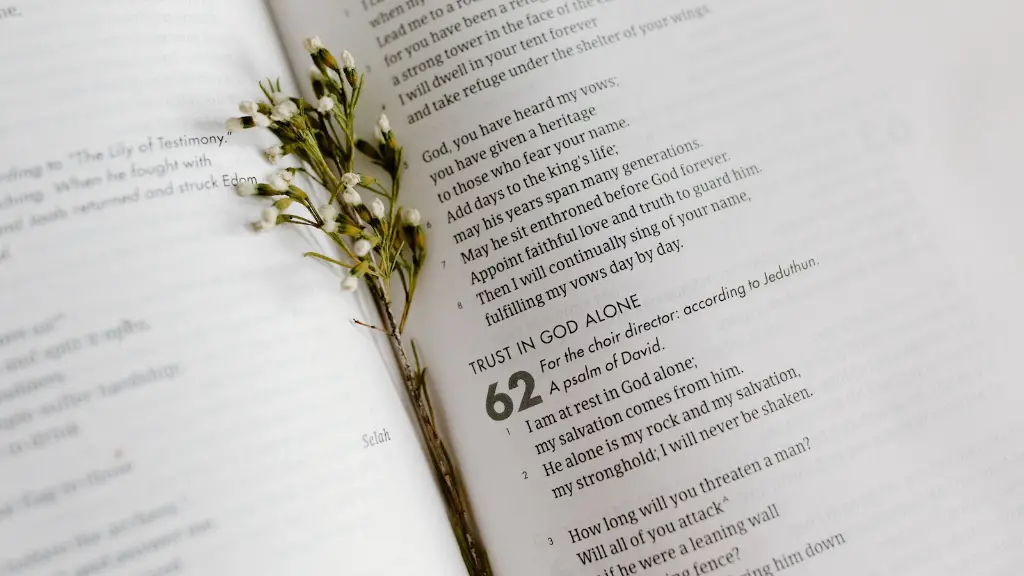Introduction
The Book of Enoch was a Jewish text from the 2nd century BC that includes references to a fallen angel called Watchers, who taught humans weapons and vanity. The text was mainstream in the first century BC, but was destroyed in the second century AD. Many argue, however, that the Book of Enoch was once in the Bible, but was eventually taken out. Was the Book of Enoch ever in the Bible?
History of the Book of Enoch
The Book of Enoch was composed during the second and first centuries BCE, during which time it was adopted among a large number of Jewish communities in the Middle East. The book is said to have been written by Enoch, the seventh antediluvian patriarch, who is thought to have received it as a revelation from God. The Book of Enoch was accepted as canon by many of the early Church Fathers, including Clement of Rome, Justin Martyr, Irenaeus, and Tertullian. It was, however, later removed from the biblical canon by the fourth and fifth century Christian councils.
Was the Book of Enoch Ever in the Bible?
Despite being commonly accepted as genuine by early Church Fathers, the Book of Enoch was officially removed from the Bible. The fourth century Nicene Council and fifth century African Hippo Council specifically decided to omit the Book of Enoch from the Bible, stating that it was not a divinely inspired work. Since then, the Book of Enoch has been excluded from the accepted canon of the Bible, leading some to assume that it was included in the Bible at one time.
The inclusion of the Book of Enoch in the Bible is a hotly contested topic. A few scholars do maintain that the Book of Enoch was once included in the Bible, but had been removed for various reasons. This argument is based on its authorship, as Enoch was a major biblical figure and a descendant of Adam. Additionally, the fact that it was cited by some early Church Fathers implies that it was accepted as canonical during the early Church.
Connection With Other Texts
The Book of Enoch bears a strong resemblance to other ancient Jewish texts, such as The Assumption of Moses and the Book of Jubilees. It is thought that the Book of Enoch was influenced by these texts, as they contain similar themes and stories. For instance, The Assumption of Moses hints at the fallen angel theme, while the Book of Jubilees elaborates further on this concept. The similarities between these texts suggest that the Book of Enoch was likely influenced by them.
Theological Impact of the Book of Enoch
The Book of Enoch provides unique insight into Jewish thought of the period. It addresses a variety of topics, including the origin of evil in the world, the relationship between angels and humans, the nature of sin and punishment, and the location of the afterlife. Unlike other Jewish works, the Book of Enoch is focused on the spiritual realm, allowing for a deeper exploration of concepts involving the soul and afterlife.
The text’s inclusion of a fallen angel figure is also of particular interest. This concept of a fallen angel is unusual in Jewish texts, and its inclusion in the Book of Enoch has been interpreted as suggesting that humans can disobey the will of God and still be rewarded in the afterlife. This idea has been embraced by some Christian movements and rejected by others, leading to theological debates.
The Reception of the Book of Enoch Today
Today, the Book of Enoch remains popular among certain Christian denominations. It is sometimes used in religious services and is cited as evidence for the concept of a fallen angel. It is also occasionally used in sermons and bible studies, particularly among those who practice Angelology.
Despite this, the Book of Enoch is not accepted as canonical by any major Christianity denomination. As a result, it is not included in the Bible and is instead seen as an apocryphal work. This is due to its questionable authorship, lack of physical evidence for its existence prior to the Second Century AD and the fact that it was omitted from the biblical canon by the fourth and fifth century Church councils.
Impact of the Book of Enoch on Other Religions
In addition to its influence on Christianity, the Book of Enoch has had an impact on other religions. For instance, some aspects of the book have been adopted by members of the Rastafari movement, who believe that the fallen angel figure mentioned in the book is a symbol of African oppression. Other religious groups have also embraced certain aspects of the book, such as the Bahá’í Faith, which views the book as a source of spiritually unifying truth.
Conclusion – Rejection of the Book of Enoch
Overall, the Book of Enoch is an intriguing text. It has been adopted by some religious denominations and has had an impact on various religious movements. Despite this, it is not considered canonical in any major religion and it has been rejected by most Christian denominations. As a result, it is not accepted as part of the Bible and is instead seen as an apocryphal work.


